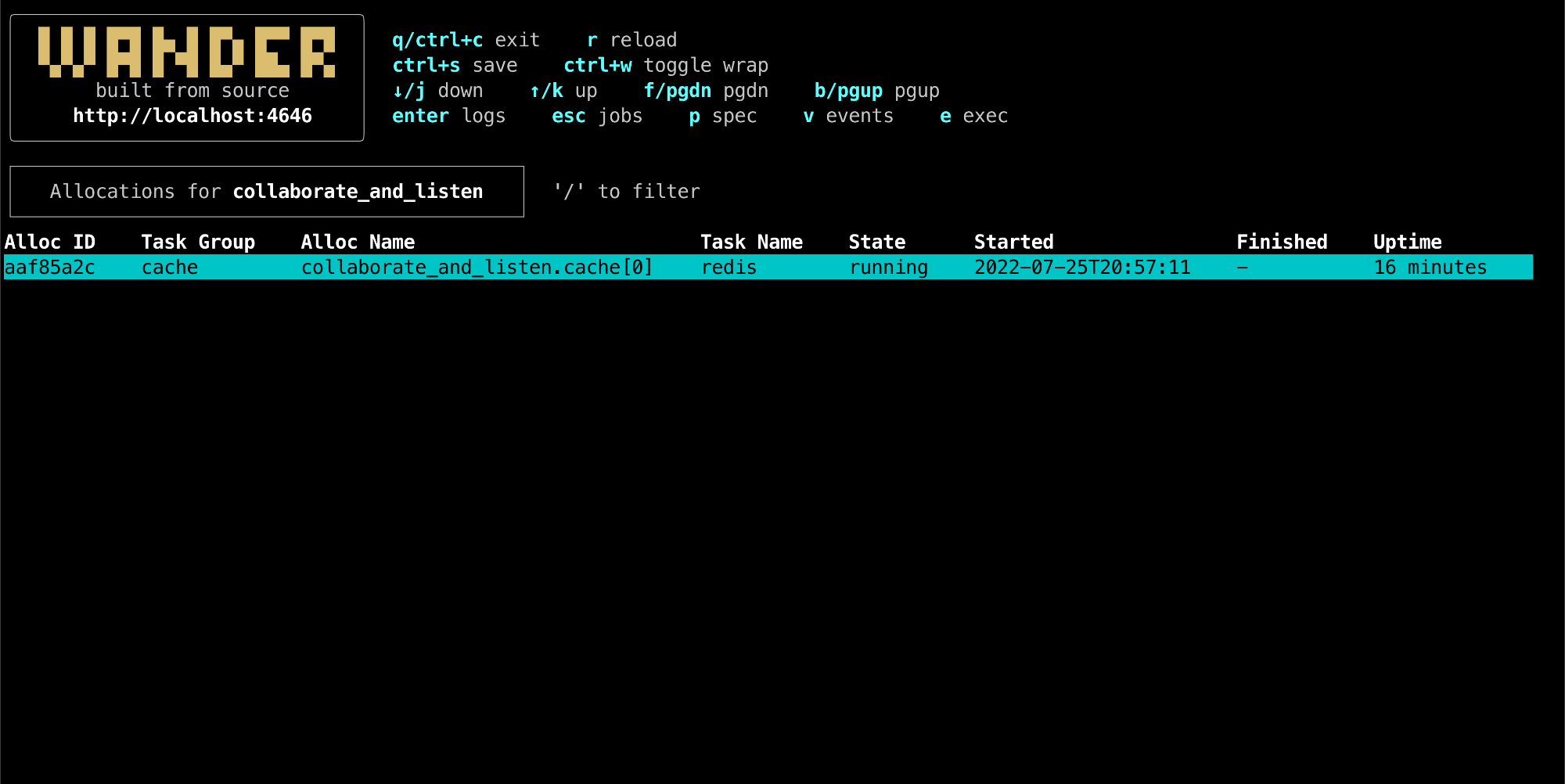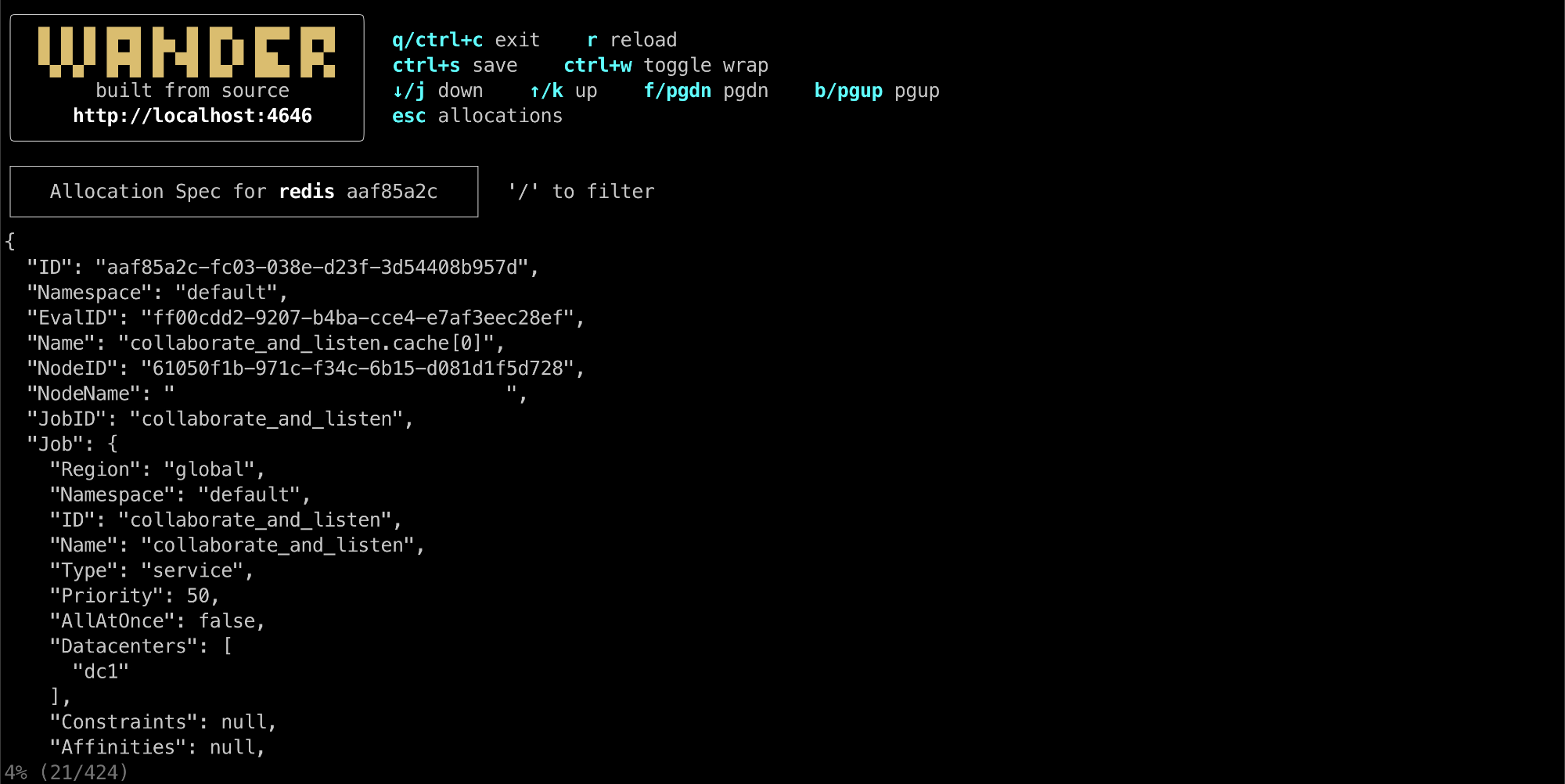An efficient terminal application/TUI for your HashiCorp Nomad cluster.
- Browse jobs, allocations, tasks, and logs
- Exec to run commands in running tasks
- Tail global or targeted events using a jq query
- Save any view as a local file
- See full specs
 View allocations
View allocations
 View logs
View logs
 Exec into running tasks
Exec into running tasks
 Tail events
Tail events
 Save any content to a local file
Save any content to a local file
 View full job and allocation specs
View full job and allocation specs

wander is written with tools from Charm.
Feature requests and bug reports for wander are welcome.
brew install robinovitch61/tap/wanderDownload the relevant binary for your operating system (macOS = Darwin) from
the latest Github release. Unpack it, then move the binary to
somewhere accessible in your PATH, e.g. mv ./wander /usr/local/bin.
> Using go installed on your machine
go install github.com/robinovitch61/wander@latestClone this repo, build from source with cd <cloned_repo> && go build,
then move the binary to somewhere accessible in your PATH, e.g. mv ./wander /usr/local/bin.
Run the app by running wander in a terminal. See wander --help and config section below for details.
wander can be configured in three ways:
- Command line arguments, visible by running
wander --help. - Environment variables. These map to the configuration file below (e.g.
nomad_addrin yaml is theNOMAD_ADDRenvironment variable). - A yaml config file at
$HOME/.wander.yaml, or a custom config file path passed to the--configargument. Complete example below.
Priority in order of highest to lowest is command line arguments, then environment variables, then the config file.
Example yaml file showing all options (uncomment an option to enable it):
# Nomad address. Default "http://localhost:4646"
#nomad_addr: http://localhost:4646
# Nomad token. Default ""
#nomad_token: my-token
# Nomad region. Default ""
#nomad_region: west
# Nomad namespace. Default "*"
#nomad_namespace: "my-namespace"
# Nomad http auth, in the form of "user" or "user:pass". Default ""
#nomad_http_auth: "username:password"
# Path to a PEM encoded CA cert file to use to verify the Nomad server SSL certificate. Default ""
#nomad_cacert: "/path/to/cert"
# Path to a directory of PEM encoded CA cert files to verify the Nomad server SSL certificate. If both cacert and capath are specified, cacert is used. Default ""
#nomad_capath: "/path/to/cert/directory"
# Path to a PEM encoded client cert for TLS authentication to the Nomad server. Must also specify client key. Default ""
#nomad_client_cert: "/path/to/cert"
# Path to an unencrypted PEM encoded private key matching the client cert. Default ""
#nomad_client_key: "/path/to/key"
# The server name to use as the SNI host when connecting via TLS. Default ""
#nomad_tls_server_name: server-name
# If "true", do not verify TLS certificates. Default "false"
#nomad_skip_verify: true
# Seconds between updates for job & allocation pages. Disable with "-1". Default "2"
#wander_update_seconds: 1
# Log byte offset from which logs start. Default "1000000"
#wander_log_offset: 1000000
# If "true", copy the full path to file after save. Default "false"
#wander_copy_save_path: true
# Topics to follow in event streams, comma-separated. Default "Job,Allocation,Deployment,Evaluation"
# see https://www.nomadproject.io/api-docs/events#event-stream
#wander_event_topics: Job:my-job,Job:my-other-job,Allocation:my-job,Evaluation,Deployment:*
# Namespace used in stream for all events. "*" for all namespaces. Default "default"
#wander_event_namespace: "*" # * needs surrounding "" in yaml
# jq (https://stedolan.github.io/jq/) query used for parsing events. "." to show entire event JSON. Default is:
# wander_event_jq_query: >
# .Events[] | {
# "1:Index": .Index,
# "2:Topic": .Topic,
# "3:Type": .Type,
# "4:Name": .Payload | (.Job // .Allocation // .Deployment // .Evaluation) | (.JobID // .ID),
# "5:AllocID": .Payload | (.Allocation // .Deployment // .Evaluation).ID[:8]
# }
# The numbering exists to preserve ordering, as https://github.com/itchyny/gojq does not keep the order of object keys
#wander_event_jq_query: .
# For `wander serve`. Hostname of the machine hosting the ssh server. Default "localhost"
#wander_host: localhost
# For `wander serve`. Port for the ssh server. Default "21324"
#wander_port: 21324
# For `wander serve`. Host key path for wander ssh server. Default none, i.e. ""
#wander_host_key_path: .ssh/term_info_ed25519
# For `wander serve`. Host key PEM block for wander ssh server. Default none, i.e. ""
#wander_host_key_pem: |
# -----BEGIN OPENSSH PRIVATE KEY-----
# b3BlbnNzaD1rZXktdjEAAAAABG5vbmUAAAAEbm9uZQAAAAAAAAABAAACFwAAAAdzc2gtcm
# ...
# XBMuWaiQMCZjAwAAAAp3YW5kZXItc3NoAQIEBAUGBw==
# -----END OPENSSH PRIVATE KEY-----
# Custom colors
#wander_logo_color: "#DBBD70"wander can be served via ssh application. For example, you could host an internal ssh application for your company
such that anyone on the internal network can ssh -p <your-port> <your-host> and immediately access wander without
installing or configuring anything.
Optionally, users can pass in their own nomad token with ssh -p <port> <host> -t <token>. The -t argument does not
stand for
token - it forces ssh to allocate a pty.
Serve the ssh app with wander serve.
You can try wander out by running a local nomad cluster in dev mode
following these instructions:
# in first terminal session, start and leave nomad running in dev mode
sudo nomad agent -dev -bind 0.0.0.0 -log-level INFO
# in a different terminal session, create example job and run it
nomad job init
nomad job run example.nomad
# run wander
wanderThe scripts/dev.sh script watches the source code and rebuilds the app on changes
using entr.
wander runs the built app. You must rerun it on rebuild.
If the WANDER_DEBUG environment variable is set to true, the dev.Debug(s string) function outputs logs
to wander.log.
